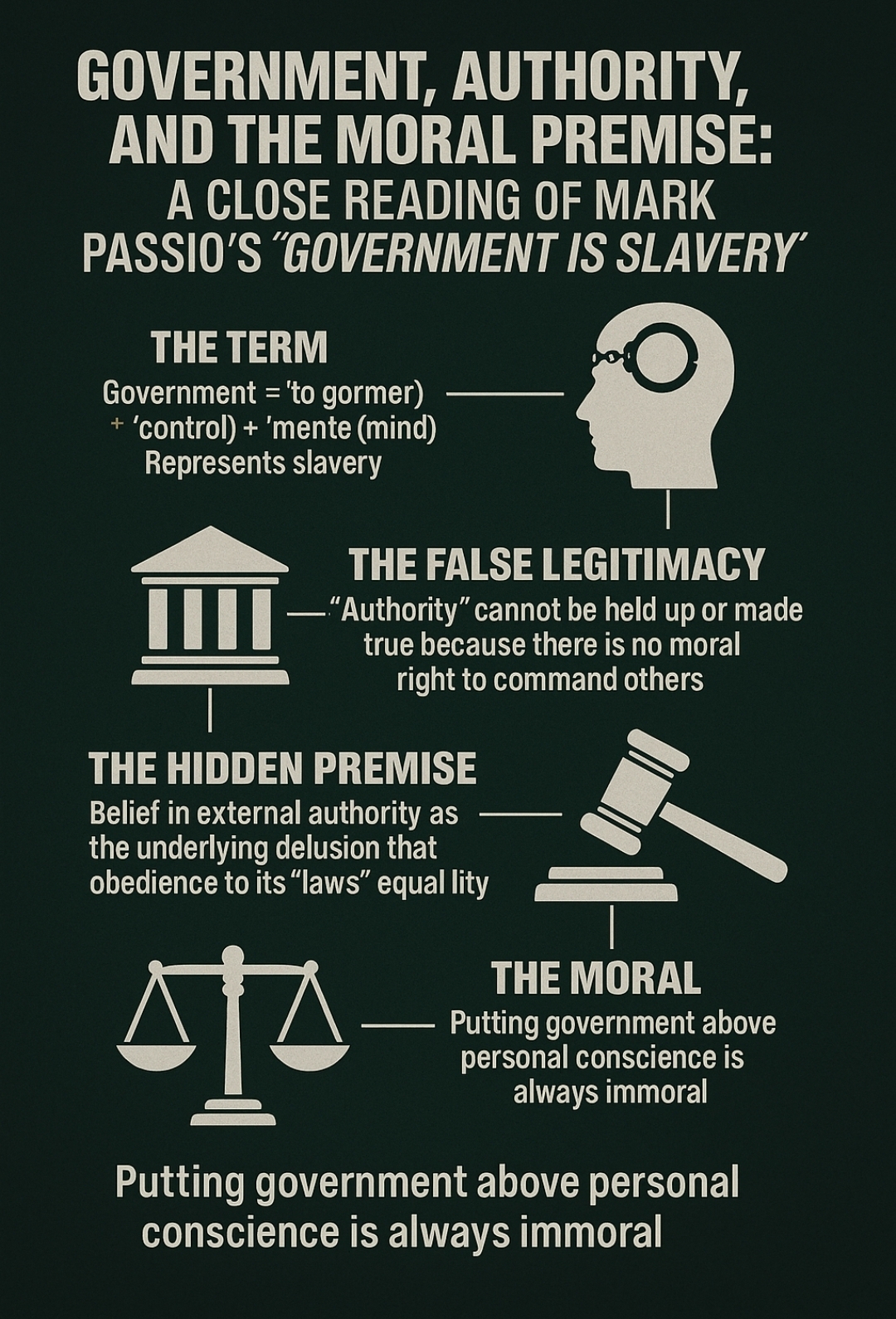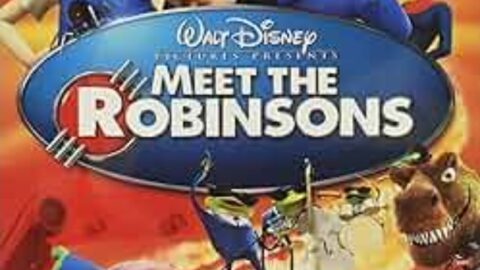Mark Passio’s keynote, “Government Is Slavery,” is less a policy talk than a moral indictment. He argues that modern people live inside a covert form of slavery—a psychological prison maintained by a religious-like belief in authority. From that premise he builds a three-act structure: (1) diagnose the problem, (2) explain why it persists, and (3) prescribe an uncompromising solution. What follows is a detailed, stand-alone article that lays out his argument, the logic that underpins it, and the practical implications he urges his audience to adopt.
The Setup: Tone, Caveats, and Stakes
Passio opens with caveats that frame everything that follows. Truth, he says, is objective and eternal; his talk isn’t “new ideas” so much as old knowledge presented plainly. He warns that his style is direct and unsugarcoated—“truth is belligerent,” because it makes war on deception. This tone is intentional: he wants to separate those willing to confront uncomfortable claims from those who reason primarily by emotion. His declared motive is moral duty: in an era of “overwhelming ignorance and deception,” the right thing is to speak.
Those opening moves do a few things at once: they pre-empt offense (“if this upsets you, that doesn’t make it untrue”), raise the moral temperature (silence is complicity), and prime the audience for radical conclusions.
The Core Thesis: Government Is Slavery
The cornerstone claim is stark: the human condition is slavery. Not the historical image of chains and auctions, but a subtler, more pervasive form: covert slavery. The instrument of this slavery, Passio argues, is government, and the psychic mechanism that sustains it is the belief in authority.
- Authority, defined: a (false) claim that some human beings possess the moral right to issue commands, while others possess the moral obligation to obey.
- What backs it: not reason or consent, he says, but violence.
- Why he calls it a religion: it possesses dogma, rituals, symbols, temples, and—crucially—requires faith in a moral hierarchy that does not exist in nature.
Historically this took two architectures. The Old World Order vested authority in a single sovereign (kingship). The New World Order disperses it across an oligarchy (modern states). In substance, Passio says, nothing changed: both models institutionalize coercion. To knowingly participate in that coercion is immoral.
The Hamster Wheel: Why “Freedom Movements” Stall
If the diagnosis is so clear, why hasn’t the problem budged? Passio’s answer is that most self-described freedom efforts are spinning, not climbing. They misdiagnose the root cause, chase symptoms (tax rates, regulations, elections), and skip the requirements for freedom. He insists the path to the summit—true abolition of slavery—demands different work than most activists are doing.
The Machinery of Control: Perception Management and the Occult
Passio’s second act answers “why the problem persists” in two layers:
- Perception management (mind control): Modern rulers govern primarily through conditioning rather than constant force—repetition, narrative control, and engineered incentives shape what people accept.
- The occult frame: “Occult” here means hidden knowledge, especially about the psyche and non-physical laws (how thoughts, beliefs, and choices ripple into outcomes). Passio distinguishes between neutral occult knowledge and dark occultism, which hoards and weaponizes that knowledge to exploit a knowledge differential. He portrays dark occultists as advanced psychologists who understand human motivation and cognition well enough to steer populations.
Passio also shares a personal note: in his past he was a priest in the Church of Satan, which he characterizes not as devil-worship but as an ideology of radical selfishness. He cites this to claim insider familiarity with cult dynamics and the mentality of manipulative elites.
Human Nature, Reframed: Programmability
Against caricatures that humans are “naturally good” or “naturally evil,” Passio offers a third option: humans are programmable. He likens a person to a computer:
- Drive format (childhood): trauma and attachment patterns lay down the “file system.”
- Operating system (culture): institutions and norms set the ambient rules.
- Software (beliefs): dogmas—like the belief in authority—shape what runs.
Garbage in, garbage out: low-quality inputs (lies, fear, coercion) produce low-quality outputs (self-defeating behaviors and social decay). If social engineers control the inputs and you don’t realize you’re programmable, you’re easy to steer.
Natural Law and Objective Morality
Here Passio pivots to the engine room of his worldview: natural law. He defines it as universal, inherent, objective, eternal, and immutable conditions that govern the consequences of behavior for beings who can tell harm from non-harm. In plainer English: there are real moral rules baked into reality, and they bind us whether we acknowledge them or not.
Rights, defined apophatically
A right is an action that does not initiate harm to another sentient being. The most reliable way to understand rights, he says, is by what they are not.
The catalogue of wrongs (all forms of theft)
Every wrongdoing is, at bottom, theft—taking what you have no right to take:
- Murder: theft of life
- Assault: theft of bodily integrity
- Rape: theft of sexual consent
- Theft: appropriation of property
- Trespass: theft of safety in one’s domain
- Coercion: theft of free will
- Deception: theft of informed consent / knowledge
Compressed to one rule: Don’t steal. If a behavior doesn’t initiate harm, it’s within your rights; if it does, it’s a trespass against natural law.
Passio notes that many people confuse resources (food, housing, clothing) with rights. You may have a right to seek food (so long as you don’t harm others to get it), but food itself is not the right; the non-harmful action is.
He also challenges conventional lists like the seven deadly sins. Pride or gluttony may be unwise, but they’re not rights violations per se. Natural law is concerned with harms to others, not with policing every vice.
Freedom Tracks Morality
From here Passio formulates a simple law: aggregate freedom rises and falls with aggregate morality. As a population’s behavior aligns with natural law, freedom increases; as behavior departs from it, freedom contracts. He presents this as science rather than creed, even gesturing at a summation equation to express the direct proportionality. The philosophical upshot is bracing: you cannot have freedom without morality—and no policy workaround can substitute for that foundation.
The Prescription: The Lost Word and the Only Moral Stance
If the cause is moral and psychological, the remedy must be too.
1) Say the “Lost Word”: No
Passio borrows from Masonic lore to argue that the “lost word” is not a cipher but a practice: the willingness to say no to immoral commands, incentives, and systems. Before building anything new, stop complying with evil.
2) Put principles first
Etymologically, principia means first things. In practice: moral education must come before politics, finance, or technology. Otherwise, any “parallel system” can be coerced, captured, or crushed by those who still believe in authority.
3) Embrace anarchy (no rulers), not lawlessness
Passio is careful about definitions. An- (without) + archon (ruler/master) yields anarchy = without rulers. It does not mean “without rules.” Natural law is the permanent rule set. What must go are masters—the claimed moral right of some humans to rule others. By his lights, no political position is moral; the only moral stance is abolitionism—the end of authority and government as institutionalized coercion.
4) Do the Great Work
He calls the strategy the Great Work (magnum opus): learn objective morality and natural law, then publish and teach it until it becomes common sense—especially to the young—using all modern media. He suggests an 80/20 focus: 80% of effort to principles and moral education, 20% to parallel systems (alternative finance, food networks, tech), which will only be resilient once the moral ground shifts.
Strengths and Tensions in the Argument
Even if you don’t adopt Passio’s conclusions wholesale, several strengths are hard to miss:
- Moral clarity: By reducing wrongs to initiatory harms and compressing them into “don’t steal,” he gives a clean test for legitimacy.
- Definition hygiene: He forces precise meanings for terms (authority, right, anarchy), preventing arguments from sliding around on vague words.
- Agency focus: The remedy starts with personal refusal and education, not distant reforms—actionable whether or not institutions cooperate.
There are, however, tensions worth flagging:
- Authority vs. consent: By defining authority as inherently coercive, he rules out any authority that rests on voluntary delegation. Some will argue that legitimate authority can be conditional, revocable, and non-violent.
- All wrongs as theft: It’s elegant, but it stretches “theft” to cover deception, coercion, and violence. Many will accept the framing; others will want separate moral categories to preserve nuance.
- Anarchy’s feasibility: Even if morally coherent, people will ask how complex services (e.g., courts, defense, infrastructure) operate without institutional authority. Passio would answer with voluntary arrangements and natural law, but skeptics will seek concrete models and failure modes.
- Evidence claims: Where he cites insider experiences or public ignorance (e.g., street interviews), the takeaways hinge on representativeness. The argument can still stand philosophically, but empirical breadth matters if you want to generalize.
These tensions don’t refute his case; they mark the live debates a reader must navigate.
Practical Implications: What You Can Do Today
Whether you endorse the whole program or simply find parts compelling, the practical punch list is lucid:
- Adopt the harm test. Before acting—or supporting a policy—ask: Does this initiate harm against a non-consenting person? If yes, it violates natural law.
- Clean inputs. Audit the information “programming” you accept. Reduce fear-based and manipulative sources; increase first-principles learning (logic, ethics, fallacies, incentives).
- Practice the word “No.” Don’t comply with directives that violate natural law. Start small (personal, professional boundaries); scale up.
- Teach the definitions. Make the distinctions (right vs. resource, anarchy vs. chaos, consent vs. coercion) common knowledge in your circles.
- Build with consent. Where you do create alternatives—mutual aid, private arbitration, food co-ops, parallel finance—structure them on voluntary participation and non-harm.
- Mind the 80/20. If you’re excited about new tech or parallel institutions, great—but keep the bulk of your energy on moral education. Without it, gains are brittle.
Conclusion: Freedom as a Moral Technology
Passio’s talk is a provocation with a single through-line: freedom is a moral technology, not a political gift. If you believe authority grants moral permission to coerce, slavery follows—no matter how modern the branding. If, instead, you anchor behavior in natural law—non-harm, non-theft, consent—freedom expands.
You don’t need permission to begin. Start with the definitions. Test every policy and habit against initiatory harm. Rehearse the lost word—no—wherever coercion dresses up as duty. And teach what you learn until the distinctions become common sense again. By Passio’s lights, there is no other route to the summit.
Point-by-Point Summary of Mark Passio’s “Government Is Slavery”
0:00–1:09 — Intro & Speaker Framing
- Host intro: Presents Passio as a “foremost expert on natural law” and “objective morality,” praising his courage and positioning him as a mentor/leader who can catalyze “pure freedom.”
- Stage setup: Frames the talk as ancient wisdom unveiled and a call to become “sovereign creators” of collective reality.
1:09–2:24 — Thank-Yous & Title
- Gratitude & audience poll: Thanks organizers; asks who knows his work vs. who’s new.
- Talk title: “Government Is Slavery.”
- Claim: This statement is true, and he will 1) explain why and 2) give the solution.
2:24–3:19 — Caveat 1: No New Truths
- “Nothing new under the sun”: Truth is objective and eternal; he’s not debuting novelties, just presenting timeless truths in his own style.
3:19–4:41 — Caveat 2: Delivery & Audience
- Direct/“belligerent” truth: He won’t sugarcoat; the talk is for “psychologically mature adults.”
- Truth vs. feelings: If it upsets you, that doesn’t make it untrue.
- Motto: “Telling the truth and making someone cry is better than telling a lie and making someone smile.”
4:41–5:39 — Why He Does This Work
- Motivation: Not for popularity, money, or friends; he believes he has a moral obligation to speak in a time of “overwhelming ignorance and deception.”
- Ethical anchor: “Right is right even if everyone is against it; wrong is wrong even if everyone is for it.”
- Mentions his website and logo; identifies publicly with the message.
5:47–6:56 — Self-Identification
- Roles: Aggregator of ancient/occult knowledge, “de-occultist” (revealer of hidden knowledge).
- Primary identity: Abolitionist—against all forms of slavery (physical, spiritual, overt, covert).
- Moral claim: Slavery is the “abomination of abominations,” and any moral person should oppose it fully.
7:03–9:11 — Part I: The Problem = The Human Condition
- Core claim: “The Human Condition is slavery.”
- Form today: Not chains and markets (chattel slavery), but covert slavery via mind control—false axioms and belief systems that condition obedience.
- The mechanism: We live in a “prison of the mind,” the hardest to see and defeat.
9:18–12:10 — Government as Covert Slavery
- Thesis: Government = authority = slavery.
- Authority defined: A (false) claim that some may issue commands and others must obey; backed only by violence.
- Religious critique: Authority is a religion (with temples, rituals, symbols) built on the dogma that some are masters (with “moral right” to command) and others are slaves (with “moral obligation” to obey). This, he says, is a diseased belief.
13:12–16:07 — Old vs. New World Order
- Old model: Kingship—authority vested in one (overt violence).
- New model: Oligarchy—authority dispersed among a few (same structure).
- Conclusion: Name change, same slavery. Participation in it is immoral by definition.
16:18–20:17 — “Freedom Movement” Isn’t Moving
- Goal image: A person wants to reach the peak: “true human freedom” (abolition of government).
- Claim: The so-called freedom movement hasn’t met the requirements to progress toward that peak.
- Background note: He says he saw insiders (eugenicists/“covert controllers”) at a low level, enough to “blow the whistle.”
- Dark humor: The movement is a hamster on a wheel—lots of motion, no progress.
20:25–24:44 — Part II: Why the Problem Persists
- Method of rule: Perception management/social engineering (mind control) rather than constant overt violence.
- Fuller quote: We’re imprisoned by misorientation and misinformation; our thinking is conditioned.
- Occult first principle: Mind precedes manifestation (law of mentalism). Change must start in consciousness (care/heart → mind → world).
24:44–30:03 — The Occult & Dark Occult
- Definition: “Occult” = hidden knowledge, especially about psyche and non-physical laws.
- Dark occultists: Those who hoard and weaponize this knowledge for manipulation/enslavement.
- Personal history: He states he was a priest in the Church of Satan (appointed by Anton LaVey), framing Satanism as not devil worship but an ideology of extreme selfishness and psychopathy.
- Key point: Think of dark occultists as advanced psychologists exploiting a knowledge differential over the masses.
31:04–36:05 — Human Nature & Programmability
- Human nature (as he defines it): Not inherently good or evil; it’s programmable.
- Computer metaphor:
- Drive format = childhood (trauma/attachment lay the “file system”),
- Operating system = culture/institutions,
- Software = beliefs/dogmas (e.g., belief in authority).
Garbage in → garbage out (bad inputs → harmful behaviors/conditions).
- Who programs? Social engineers who understand this dynamic.
36:05–40:19 — The “Secret of Secrets”: Natural Law
- Natural law defined: Universal, inherent, objective, eternal, immutable conditions governing the consequences of choices by beings who can discern harm.
- Karma as aggregate: Effects unfold across societies and time (not cartoonish instant payback).
- Conscience (etymology): Con- (with) + scientia (knowledge) → shared knowledge of right vs wrong.
- Claim: Morality is objective, and most people do not know right vs wrong—hence slavery persists.
40:26–47:01 — Rights, Wrongs, & “Don’t Steal”
- Right (definition): An action that does not initiate harm to another sentient being (defined apophatically—by what it isn’t).
- His street poll (Philadelphia, 2019): He says zero respondents correctly defined a right; many confused rights with resources (food, shelter, clothing) rather than actions.
- Seven deadly sins critique: Pride, gluttony, sloth, lust, anger, envy, greed are not per se violations of others’ rights (though they may lead to them).
- True wrongs = forms of theft:
- Murder (theft of life),
- Assault (theft of bodily integrity),
- Rape (theft of sexual free will),
- Theft (property),
- Trespass (safety in one’s domain),
- Coercion (free choice),
- Deception (informed consent/knowledge).
- Compression into one rule: “Don’t steal.”
- Meta-claim: All rights are property rights; all violations are theft.
47:01–48:13 — Freedom–Morality Equation
- Law of freedom: Aggregate freedom rises and falls directly with aggregate morality.
- Math flourish: Says he has a summation equation (Σ freedom ∝ Σ moral behavior) and plans to submit a paper—framing this as science, not religion.
49:02–51:07 — Part III: The Only Solution
- Stop putting the cart before the horse: The answer isn’t to invent new systems first.
- Primary act: Withdraw complicity with evil; take back power by using the “Lost Word” of Freemasonry: “No.”
- Priority: Truth and moral refusal precede all system-building.
51:40–53:23 — Principles First, Then Systems
- Parallel systems warning: New currencies/tech/food systems can be destroyed while belief in authority persists.
- Abolish the belief in authority (i.e., belief in slavery) first.
- Principles (etymology): Principia = “first things.” Moral education must come before everything else.
53:29–57:08 — Anarchy as the Only Moral Stance
- Redefinition: “Anarchy” = an (without) + archon (ruler/master) → without rulers, not “without rules.”
- Natural rules remain: Natural law always binds; what must go are masters.
- Position: No political stance is moral; only the absence of rulership (anarchy/voluntarism/abolitionism) is moral.
- Government, by nature, is immoral because it rests on coercion/duress.
57:08–1:00:55 — The “One Great Work”
- No political/financial/tech fix: The solution is spiritual: widespread understanding of objective morality and natural law.
- Primary mission: Moral education of humanity (especially youth) using the internet and media—what he calls the Great Work (magnum opus).
- 80/20 split: He argues for ~80% effort on moral education and 20% on parallel systems/technologies. Without the 80%, the 20% will be crushed.
1:00:55–End — Close
- Reprise: This knowledge is a human birthright and must be made common sense.
- Thanks & applause.
How the Arguments Interlock (the skeleton of his case)
- Diagnosis: Today’s slavery is mental/occult—belief in authority conditions obedience (government = slavery).
- Mechanism: A small cadre (dark occultists) exploits human programmability using hidden knowledge of psyche and natural (non-physical) laws.
- Moral frame: Natural law makes morality objective; wrongs are all forms of theft. Most people don’t truly know this, so they accept authority.
- Consequence law: Freedom tracks morality (not politics, tech, or economics). Low morality → low freedom.
- Prescription: First, say “No” to complicity; abolish the belief in authority; embrace anarchy (no rulers) as the only moral stance.
- Strategy: Make moral knowledge common via mass education (the Great Work). Build parallel systems after the moral foundation is laid.
Notes & Observations (neutral)
- Rhetorical style: Confrontational and absolutist by design (“truth is belligerent”), with etymologies, formulas, and insider anecdotes to project authority.
- Key redefinitions:
- Anarchy as “no rulers,” not “chaos.”
- Rights as actions (negative/harmless), not resources.
- All wrongs as theft.
- Binaries: Government/authority are treated as inherently immoral; anarchy/abolitionism as inherently moral. Little space is left for mixed or gradualist views.
- Center of gravity: Everything pivots on natural law and objective morality—learn it, teach it, or remain enslaved.







